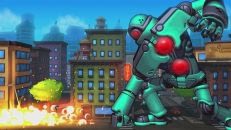A New Editor-in-Chief Has Entered The Ring!
Buckle up, readers. Daniel Horowitz here, your new Editor-in-Chief speaking. Silly Street Fighter references aside, I’d like to take this opportunity to introduce myself to the community and officially start my place in the hallowed halls of The Indie Game Magazine, an organization that I’ve been a fan of for some time.
To give you a little background into myself and my experience, I graduated from Sarah Lawrence College this past May, where I studied in Creative Writing, and also did a year-long stint at the University of Oxford. I’ve been writing and editing for and about games for some time now, and am genuinely excited to continue bringing a wealth and depth of indie games content to you all.
That being said, besides this brief(est) of introductions, I’d like to give my own personal take on the following: What constitutes an indie game or title?
Everyone’s favorite ridiculous dictionary site UrbanDictionary defines indie as “A gloriously vague term…” and I couldn’t agree more. When it comes to music, movies, games or any other form of media, we typically like to think of indie as something that is independently made and not corporate-backed, but in reality, that’s only about half the truth. What indie really means – if it even means anything, is that the piece of media was hand-crafted with love and care, and tells a personal development narrative as opposed to a non-personal one.
That’s not to say that in the case of games, an indie title cannot be corporately backed. Take the example of Supergiant Games’ Bastion , which despite having Warner Brothers as the publisher of the title, shared the vision of Supergiant Games for the title, creating an immersive world and gameplay experience. While they likely had a substantial budget to work with, the game world also shared a unique viewpoint that felt indie, that made a statement that wasn’t just non-stop in-your-face action, violence and gratification.
Besides for my new duties at The Indie Game Magazine, I myself am also an indie comic book creator. What this really means in the comic book industry is that I haven’t had any stories published by the Big 2 (although I did intern at Marvel back in my college days), and all my work thus far has been independent creator-owned stories that have been published by relatively small publishers. While this doesn’t mean that I will always be indie (if I ever wrote Captain America, I would no longer be indie, although I would be the happiest man on Earth), it’s definitely a fit that works for me now, and I hand-craft my stories with a certain love and care, trying not to phone in anything at this stage.
Ultimately though, indie games and other media have a certain feel to them, a certain vibe that is most definitely indie. No one would argue that a game like Rogue Legacy is a premier indie title, while something like the Mass Effect trilogy is most certainly not a series of indie games. That doesn’t make one inherently worse than the other, but of course we’re only here to talk about what we’re named for here at The Indie Game Magazine.
So take a ride with me on this wild journey of exclusive daily indie games coverage, as we continue to evolve and grow in what we think of as indie, both in the games industry and beyond. In the meanwhile, feel free to follow me on Twitter @HorowitzCentral for the latest and greatest in indie coverage.





